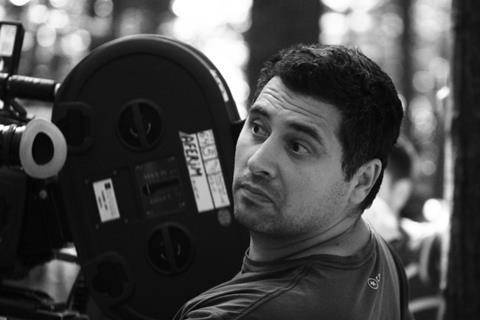
Radu Jude is one of Romania’s most visible and lauded filmmakers thanks to films such as Aferim!, for which he won the Silver Bear for best director at the Berlinale in 2015.
His latest film ”I Do Not Care If We Go Down In History As Barbarians” is a drama examining Romanian anti-Semitism during World War Two filtered through the efforts of an artist in the present day. The film is making its world premiere in official competition in Karlovy Vary.
Screen: You’ve just done two period films in Aferim! and Scarred Hearts. Why did you decide to move to a more contemporary setting with ”I Do Not Care If We Go Down In History As Barbarians” rather than do a straight historical re-enactment?
Radu Jude: Well, even the two films you mentioned had, at least in part, some elements that made them not so straight historical reconstructions: the dialogue was mostly a collage of quotes from different sources and the composition of the shots were somehow more obvious than in a so-called ‘realistic’ film.
For the new film I chose a contemporary setting for many reasons, the most important two being: first, one cannot stage the massacre of thousands and thousands of people for the camera – it is impossible from a technical point of view and I am not sure how one can deal morally with that; and second, I was more interested to offer not a historical film, but a present-day film in which history is brought up in order to create an image in the sense of [German philosopher] Walter Benjamin – an image created by the meeting of something from the past with something from the present.
Much of the film deals with past and present anti-Semitism in Romania as you present a country that has defined itself by a sense of victimhood without acknowledging the truths of its past. Do you think Romania will ever find a more objective view of its recent history? Or is your film an expression of exasperation?
Both. One can be exasperated, that’s for sure. But there’s also a progress that was made regarding the acknowledgement of our past, first at the official level, due to the pressure from the European Union. But that’s a progress one should notice. The film I have made wouldn’t be possible 20 years ago when there were so many streets bearing the name of [Romanian fascist leader] Marshal Antonescu.
But this progress is very thin and very much endangered. A few days ago important representatives of the Romanian ruling party named the people who protested against them “rats”, something that reminds us about the policies of Nazi Germany.
Can you expand on your idea to give the film a Brechtian spin, as it declares its own fictional status as a film in the opening minutes. Is that about making it easier for people to confront their own history?
The truth is I opted for this approach out of a kind of honesty in the relationship with the viewers, something like saying, ”Look, I cannot reconstruct the whole war or the whole of Odessa massacre from 1941, but at least I could offer some elements that can make us think together about it, about what happened, about how can we represent it and about what we can do from now on.”
It was also a way to bring together elements that couldn’t find their way in a straightforward reconstruction: literary texts, photographs, archive footage, philosophical quotes, theatre etc. I believe, like Italo Calvino, that a film about history should be something else than the simple staging of a historical event.
Is the film also an exploration of representation?
Of course you are right, it is a film that raises – I hope – this question of how we can represent reality in cinema, how can we represent the past. It is a difficult question, it always was and it becomes more and more difficult not only because of the “fake news” as such, but because the world we live in. The virtual world of 0 and 1 makes everything ontologically more complicated. You see a photograph on the internet and you don’t have, and cannot have, any idea if it represents accurately a reality, a complicated concept anyway, or if it is entirely made up. It is frightening and intellectually engaging in the same time.
How much is the lead character of Mariana Marin an avatar for you? You have talked in the past about how reading about how some of the great intellectuals and writers in Romania that you admire turned out to be unrepentant Nazi sympathisers and anti-Semites, much to your frustration, and we notice that in her character. Were there reasons for naming her after a famous Romanian poet?
I would avoid talking about similarities between me and the main character. Of course there are some, but there are some between myself and the other characters as well. My frustration is smaller than her’s. I learned to be more amused than angered. Maybe it is a sign of getting older, who knows? Mariana Marin was a wonderful poet, it is a discreet homage I pay to her.
How do you think Romanian society will react to this film?
Most of it with indifference, some with a positive attitude and the right-wing people with the same insults I have already got used to: “Fuck you and your mother, you scumbag”, “I will kill you if I meet you”, “Leave the country if you don’t love it, you fucking bastard”. Or maybe it will be a little bit more, judging by the fact that the nationalism and fascism are rising all over Europe.
Was this film easy to get funded? Was there any resistance to the subject matter?
No, it wasn’t very easy to get funding, but we didn’t face a big resistance either. But that was two years ago, I am not sure it would be so easy now. Or maybe Romania will not follow completely in the steps of Poland or Hungary, who knows. Let’s be optimistic – I try to.
What projects are you planning next?
Too many. I have just finished a 10-minute essay film done with archive footage, called The Marshal’s Two Executions. And I am preparing a film adapted from a play by Gianina Cărbunariu, a Romanian theatre director and playwright I admire a lot. She had the great idea to transform the texts from a Securitate file into a play and I am going to stage her text and then edit it including archive images from the television.
















![[L-R]: Amanda Villavieja, Laia Casanovas, Yasmina Praderas](https://d1nslcd7m2225b.cloudfront.net/Pictures/274x183/6/4/1/1471641_pxl_20251224_103354743_618426_crop.jpg)





No comments yet